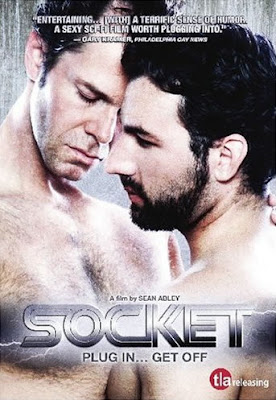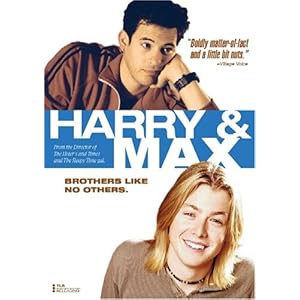The star player of Icelands top football team causes a stir when he admits to being gay to his team mates and then goes on a journey to discover himself (with the help of the local press). He soon finds himself on the bench for most of his teams matches and decides to call it quits and join a small amateur team made up of men like himself - gay guys trying to play football in a straight world of Icelandic fishing culture machoism. Written by mosfilm
SCREEN SHOT :
By Marilyn Ferdinand
My local library, the
Skokie Public Library, is, I’m convinced, the most wonderful community library in the country, and it’s got the credentials to prove it—the 2008 National Medal for Museum and Library Service, the nation’s highest honor for libraries. The huge catalog of foreign-language films the library carries or has available for download to accommodate village residents who speak one or more of 97 languages likely cannot be found in even the best video rental sources. And while I would never guess that Icelandic was one of those languages, the Skokie library has a few titles from that small country as well. The hubby picked up one of them yesterday for our evening entertainment, an irresistible-sounding film about a gay soccer club based in Reykjavík.

Eleven Men Out wastes no time in getting to the point. The powerful pro team, KR, moves into the locker room after a game, where they are pursued by photographers and reporters. One of the reporters is talking to Ottar Thor (Björn Hlynur Haraldsson), who is concerned where a photo of him will be placed in the magazine. She says that it will be on the last page, the last thing people read. He complains. She says that if he gives her something good, he could get a cover. He decides on the spot to come out as gay to her, the photographers, and his unsuspecting and flabbergasted teammates. Ottar gets his magazine cover—and gets booted off the team by the homophobic team owner.

Ottar’s father (Sigurður Skúlason) tells him to give up this nonsense or, barring that, to get psychiatric help to “cure” his “illness.” Ottar’s brother Orri (Jón Atli Jónason, who cowrote the screenplay), a completely contemptible person who treats his girlfriend of two months like trash, merely insults his brother at every opportunity and shows more concern for the money owed him for rentals from his video store than the tumult Ottar has caused his parents. Gugga (Lilja Nótt Þórarinsdóttir), Ottar’s ex-wife and a former Miss Iceland, is sloppy drunk for most of the movie; neither she nor Ottar understand how Ottar has made their son Maggi’s (Arnmundur Ernst Björnsson) life hell at school.

Ottar’s friend Pétur (Helgi Björnsson), a former pro who had his moment of glory scoring a goal off the mighty Arsenal team in London, coaches an amateur soccer team. He offers Ottar a position, mentioning that his team has a few gay members so Ottar won’t get the same treatment as he did on KR. Alas, Ottar is now a very high-profile homosexual, and the few straight men on the team resign. The discussion Pétur has with them is hilarious in its circularity (“But I’m not gay.” “Exactly. That’s why this isn’t a gay team.”). Of course, it doesn’t matter that the team is mixed; perception is everything, and these men fear guilt by association.

Eventually, the team is composed entirely of gay players. They change the name of the team to Pride United and adopt a uniform that has a rainbow stripe on the sleeve. After winning their first game through the homophobic forfeit of the other team, they finally get a chance to prove their worth by winning enough games to reach first in their league. A random drawing of teams for the playoffs has them bussing to northern Iceland to play a team in an isolated hamlet and partying in a pathetic disco called Club Cambodia, run by the Cambodian wife of the other team’s coach. Maggi meets their lovely half-Cambodian daughter Rosá (Pattra Sriyanonge), who asks the 13-year-old boy if he wants to fuck. He’s taken aback and nervous, but she says matter-of-factly that there’s not much else to do in her town.

The film climaxes when KR, worried about fallout from their homophobia, agrees to play Pride United. The date of the match falls, coincidentally, on the same day as Reykjavík’s gay pride parade. As a multicolored balloon ribbon follows the floats filled with drag queens down the streets of Reykjavík, Pride United and KR face off. If you want to know the outcome, stay with the closing credits; this film does not traffick in the traditional underdog payoff of most sports movies by filming the big game.

To many Americans, this film may seem thoroughly contemptible and behind the times. After all, have we not seen openly gay politicians rise to national prominence, openly gay entertainers like Ellen DeGeneres win lucrative modeling contracts and continue on with their successful careers, gay writers land on best-seller lists? Have we not also seen gay bashing continue, gay marriage rights come—and go—in various states, strong coalitions of religious leaders forming organized offensives against gay rights of every stripe? Have we not seen a 2010 film by a gay director present two lesbians in the most straight-friendly manner imaginable? If you listen carefully to the Icelandic, you’ll notice that the language has only one word for homosexual, whereas the subtitles change it up frequently. This one difference represents what I like so much about Eleven Men Out—its direct approach to its subject.

The film doesn’t sugarcoat the homophobia that exists in Iceland; it also doesn’t have its gay characters back down into stereotypes or defensiveness. Ottar says he is what he is, and by the way, that includes a narcissistic soccer star whose vanity brought him out of the closet without considering the consequences of an abrupt public outing on his teammates, friends, and family. Continuing with his tunnel vision, he takes up with a young soccer player on Pride United, offering up movie theme nights for entertainment; he’s caught completely off guard when his lover walks out on him, preferring to spend his time in more youthful, active pursuits. He is also careless about having Maggi walking in on him having sex with his lover. The film is utterly casual about nudity, mixing women and naked men in locker rooms without comment; a group hug in the showers is handled unself-consciously by the actors.

The film also doesn’t whitewash the very serious drinking problem the country has, as evidenced by Icelandic singer Björk’s
admission to drinking a liter of vodka every Friday, a “custom” she picked up from her grandparents. Gugga is drunk all the time, but so is everyone else in the film, and there are virtually no scenes in which a character doesn’t have a drink in his or her hand. It also doesn’t present picture-postcard images of Iceland; in fact, I’m surprised the populace hasn’t drowned in all the rain, which isn’t the gentle mist one finds in more image-conscious Irish films, but comes down in torrents on the umbrella-free characters.

While Eleven Men Out strives for some kind of upbeat ending, with the Pride/KR match, Gugga’s entry into rehab, a real talk between Maggi and his parents, and Ottar’s mother (Lilja Guðrún Jónsdóttir) forcing her husband to sit in the stands with the fans of Pride United, the film doesn’t foresake the reality of Iceland’s attitude. “You didn’t expect us to win,” Ottar says to Pétur, a wonderfully comic line that sums up a realistic, sardonic attitude not only to the difference in skill between Pride United and KR, but also the uphill battle facing homosexuals in a society whose language has barely changed since it landed on the island in the 9th century.

I like how unsympathetic a part Atli Jónason was willing to write for himself, making him the perfect comic man you love to hate. This is a funny movie, but it’s not blind to the seriousness of its subjects and isn’t willing to turn its characters into caricatures for the sake of a few yucks. Unlike a film I didn’t much like, Up in the Air (2009), it doesn’t use its serious subjects as mere background. The film is too packed to get a deep character study, but we do get a good feel for the nasty situation Icelandic homosexuals find themselves in and their real strength to overcome it.





















































